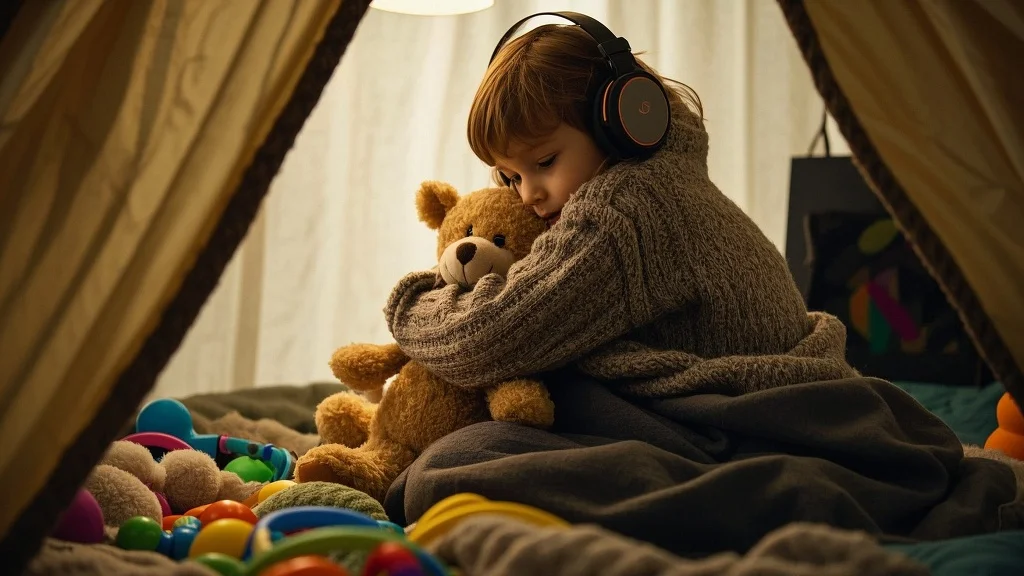3:17 AM. The monitor lights up with cries—again. You stumble to their room, bleary-eyed, wondering: “Is this normal? Should I be worried? How do I make it stop?”
As a sleep-deprived parent who’s survived two toddlers (and hundreds of interrupted nights), I’ve learned these wake-ups usually have very fixable causes. Here’s how to decode the tears and get everyone sleeping soundly.
The 7 Most Common Reasons Toddlers Wake Up Crying
1. Sleep Regression (The “Why Won’t You Stay Asleep?!” Phase)
When it happens: 18 months & 2 years are peak times
Why? Big developmental leaps (walking, talking) rewire their brains—literally.
🛌 What helps:
→ Stick to the exact same bedtime routine (consistency = security)
→ Offer comfort without picking them up (a hand on their back > rocking)
→ Remember: This passes in 2-6 weeks (survival mode is okay!)
2. Nightmares vs. Night Terrors (Yes, They’re Different!)
| Nightmares | Night Terrors | |
|---|---|---|
| When? | REM sleep (later at night) | Deep sleep (first few hours) |
| Child’s State | Awake, scared, seeks comfort | Eyes open but unaware, may scream |
| What to Do | Reassure with cuddles | Don’t wake them—just prevent injury |
Pro tip: Reduce nightmares by avoiding scary books/videos before bed.
3. “I’m Hungry/Thirsty!” (Even If They Ate Dinner)
Toddlers have tiny stomachs. A protein + carb snack 30 mins before bed helps:
🥜 Good options: Banana with peanut butter, cheese & crackers, oatmeal
💧 Hydration hack: Offer water 1 hour before bed (not right after, to avoid potty trips).
4. Room Discomfort (The Silent Sleep Killer)
Ideal sleep environment:
🌡️ Temperature: 18-22°C (65-72°F)
🌑 Darkness: Blackout curtains + dim nightlight
🔇 Noise: White noise machine (masks household sounds)
Test: Feel their neck at night—sweaty = too hot, chilly = needs a sleep sack.
5. Separation Anxiety (“Where Did You Go?!”)
Peaks at 18 months-2 years—they’re realizing you exist even when they can’t see you.
🧸 Comfort tricks:
→ Introduce a “lovey” (stuffed animal they sleep with)
→ Do gradual goodbyes: “I’ll check on you in 5 minutes” (then actually do)
6. Overstimulation (The Hidden Culprit)
Avoid before bed:
📱 Screens (blue light = alertness)
🤸 Rough play
🍭 Sugar (even “healthy” snacks like granola bars can spike energy)
Better options: Baths, quiet stories, lullabies.
7. Big Life Changes (Even “Good” Ones)
New sibling? Daycare start? Potty training? All can trigger sleep disruptions.
How to help:
→ Give extra reassurance during the day
→ Keep bedtime routines identical (familiarity = stability)
When to Worry: Red Flags
Consult a pediatrician if your toddler:
⚠️ Snores loudly (could signal sleep apnea)
⚠️ Bangs their head repeatedly
⚠️ Can’t be comforted after 30+ minutes
The 3-Step “Back to Sleep” Routine
- Wait 5 minutes (they might self-soothe)
- Comfort briefly (whisper “I’m here,” pat their back)
- Leave before they’re fully asleep (teaches independence)
💡 Game-changer: We used a “sleep training clock” (turns green at wake-up time)—cut our night wake-ups by 80% in a week!
Final Thought: This Too Shall Pass
Toddler sleep struggles feel endless—but they do outgrow them. One day, you’ll miss those tiny arms reaching for you in the dark. (Maybe. After you’ve caught up on sleep.)
💬 What’s your best trick for soothing night wake-ups? Share below!








